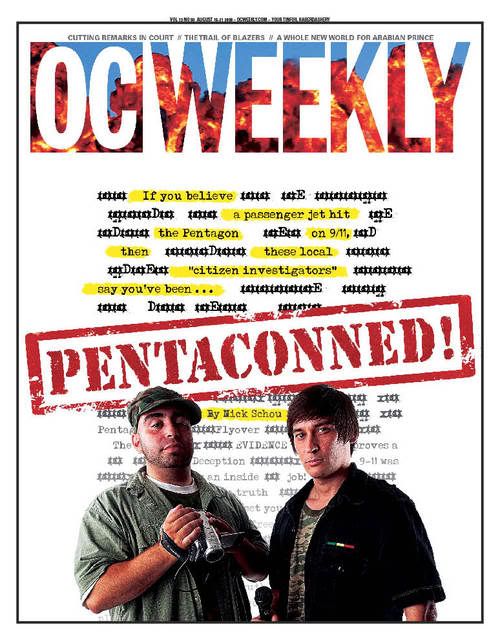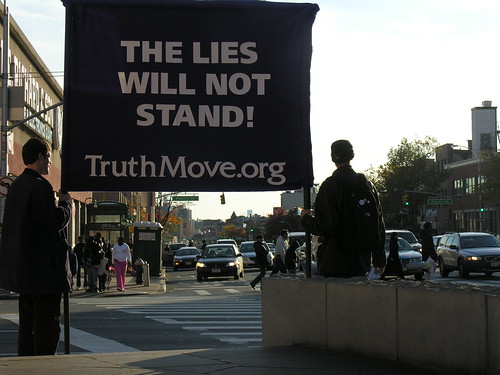 This week we saw one of the most coordinated attacks on the movement yet from the mainstream media as those promoting the fallacy that Obama isn't a U.S. citizen were widely compared to those promoting 9/11 truth.
This week we saw one of the most coordinated attacks on the movement yet from the mainstream media as those promoting the fallacy that Obama isn't a U.S. citizen were widely compared to those promoting 9/11 truth.Is there any truth to the allegation that Obama is not a citizen? One might appeal to authority and argue that we should at least take the possibility seriously because seventeen members of congress support the notion in one way or another. Of course, that would be to ignore that they are all Republican and politically motivated. This became readily apparent when a resolution proclaiming Obama's birthplace to be Hawaii passed unanimously in the House. None of those involved were willing to stand behind the allegations.
In fact, it has been established beyond any reasonable doubt that Obama is a U.S. citizen. His birth certificate is readily available. Announcements of his birth in local Hawaiian newspapers have been recovered. And a birth certificate produced that appears to indicate that Obama was born in Kenya is a very clear forgery.
One might assume that media outlets are making a connection between these claims and 9/11 truth for no other reason than to characterize 'birthers' as also being "conspiracy theorists" and therefore having no credibility. It would also be possible that some are hoping to malign the movement due to recent progress.
However, there are now at least two justifiable reasons why this connection could be made. First, attorney and problematic 9/11 truth advocate Philip J. Berg filed a petition for review of Obama's citizenship with the U.S. Supreme Court. The court tossed out the complaint, but it is still pending review by the U.S. Third Circuit Court of Appeals. The Wikipedia entry on "Barack Obama citizenship conspiracy theories" states that Berg is a "9/11 conspiracy theorist." And MediaMatters recently emphasized his relationship to the movement.
Second, Alex Jones, viewed by many as a prominent 9/11 truth movement figure, has recently promoted the 'birther' position by featuring a story on the subject at his website Prison Planet and having Berg as a guest on his show to talk about the issue. While Jones is more widely known for the extreme libertarian views he espouses on his daily radio show, many of those involved in 9/11 truth consider him to be one of the movement's most important advocates.
One might argue that if Alex Jones promotes 9/11 truth that the benefit of the exposure he is able to achieve outweighs the potential negative effect his other interests might have on the movement. Many argue that 'all press is good press.' However, in the case of Alex Jones, not only does this appear to be a foolish assumption, but his promotion of the 'birther' issue stands in stark contrast to the founding principles of 9/11 truth movement.
We have clearly seen in the past that Alex Jones is used by the mainstream media to undermine the movement, most recently when he was identified as being a potential influence on the Pittsburgh police shooter. One might argue that the movement gets this kind of treatment all the time, and yet you don't see less ideological figures like Richard Gage, for instance, being tied to violence or extremism. It is certainly what Alex Jones advocates that makes him, and by association the 9/11 truth movement, a victim of such negative publicity.
In the case of his support for the 'birther' issue we should identify an even more obvious problem. As it is clear that the issue is based in fallacy, how are we to take seriously Alex Jones' commitment to truth. Central to the credibility of the 9/11 truth movement is a strict adherence to the promotion of well founded, factual information. We make room for speculation within the realm of research. But prominent movement news is factual news. In contrast, we see here Alex Jones promoting an outright fallacy.
The 9/11 truth movement is a non-partisan effort. There should be no intent to restrict participation based on valid and tolerant political viewpoints. The problem with Alex Jones is certainly not his advocacy of libertarian values. However, it is absolutely antithetical to the core principles and integrity of the 9/11 truth movement to consider anyone promoting fallacy to be a leader. Many have expressed very strong concerns about the impact of Alex Jones on the movement. We can now add the promotion of blatant fallacy to that list.
For that reason I strongly encourage anyone concerned about this, supports and detractors alike, to seriously consider the role Alex Jones is playing in the movement at present, the impact his actions are having, and how we might, at the very least, encourage him to stick to the facts. And if he refuses to do so, we should consider distancing ourselves and our 9/11 related projects from him and his media.
Alex Jones can not be both a 'birther' and a 'truther.'














